Terracorder: Sense Long and Prosper
. In arXiv. .
Abstract
In-situ sensing devices need to be deployed in remote environments for long periods of time; minimizing their power consumption is vital for maximising both their operational lifetime and coverage. We introduce Terracorder -- a versatile multi-sensor device -- and showcase its exceptionally low power consumption using an on-device reinforcement learning scheduler. We prototype a unique device setup for biodiversity monitoring and compare its battery life using our scheduler against a number of fixed schedules; the scheduler captures more than 80% of events at less than 50% of the number of activations of the best-performing fixed schedule. We then explore how a collaborative scheduler can maximise the useful operation of a network of devices, improving overall network power consumption and robustness.
